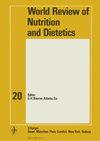一些营养目标应该转化为权利吗?
4区 医学
引用次数: 0
摘要
实现雄心勃勃的卫生目标取决于能够切实预期实现这些目标的战略。有时,途径是已知的,但没有被使用。将目标视为权利可以增强追求目标的动力。权利持有人及其代表将了解他们的权利。责任承担者将被明确地识别出来,并对他们应该做的事情负责。因此,如果将重要的营养目标视为权利,就更有可能实现这些目标。本文章由计算机程序翻译,如有差异,请以英文原文为准。
Should Some Nutrition Goals be Transformed into Rights?
The achievement of ambitious health goals depends on strategies through which their achievement could realistically be expected. Sometimes, pathways are known but not used. Treating goals as rights could strengthen the motivation to follow them. Rights-bearers and their representatives would know their rights. Duty-bearers would be clearly identified and held accountable for doing what they are supposed to do. Thus, important nutrition goals might be more likely to be achieved if the goals were treated as rights.
求助全文
通过发布文献求助,成功后即可免费获取论文全文。
去求助
来源期刊

World review of nutrition and dietetics
Nursing-Nutrition and Dietetics
自引率
0.00%
发文量
114
期刊介绍:
Volumes in this series consist of exceptionally thorough reviews on topics selected as either fundamental to improved understanding of human and animal nutrition, useful in resolving present controversies, or relevant to problems of social and preventive medicine that depend for their solution on progress in nutrition. Many of the individual articles have been judged as among the most comprehensive reviews ever published on the given topic. Since the first volume appeared in 1959, the series has earned repeated praise for the quality of its scholarship and the reputation of its authors.
 求助内容:
求助内容: 应助结果提醒方式:
应助结果提醒方式:


